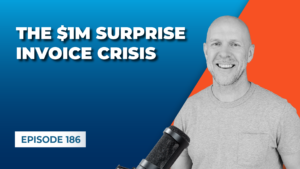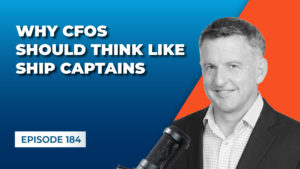In this episode, James Kennedy sits down with Craig Patterson – fractional CFO, CEO of Patterson & Associates Consulting (PAC-LLC), former Bechtel engineer, and one-time stand-up comic – to unpack how housing authorities work, why purchase orders are essential for public-funded accountability, and how AI/automation can give finance teams their evenings back. From UC Berkeley football to Department of Defense – scale builds, Craig shares a people-first approach to delivering tech that everyday teams can actually use.
About Craig Patterson
A mechanical engineering & computer science grad who cut his teeth at Bechtel on complex projects (e.g., Space Shuttle assembly building, WIPP in New Mexico, work in Jebel, Saudi Arabia), Craig later moved into consulting and fractional CFO work. Based in San Antonio, Texas, he advises U.S. housing authorities and nonprofits on policy-aligned procurement, operational efficiency, and practical AI adoption – bridging “high-end tech” to the “common user.”
What You’ll Learn
- Housing Authorities 101: Why they exist, how they’re structured locally, and the shift from government-built stock to public-private financing (e.g., tax credits) and mixed-income integration.
- POs = Proof & Protection: How purchase orders document purpose, price, approvals, thresholds (quotes/contracts/insurance), and budget fit – critical when spending restricted funds.
- Killing Double-Handling: Replacing email/Word/excel/handwritten requests with a single intake + workflow prevents re-typing and delays.
- AI that Helps (Not Replaces): Use automation to surface facts fast, reduce overtime, and let staff focus on decisions—not file-cabinet archaeology.
- Contingency vs. “Waste”: Why public budgeting needs headroom (like fuel reserves for flights) – and how transparent controls keep “more with less” credible.
- Communication as a Superpower: Comedy taught Craig that laughter = breathing = learning – use plain language to teach finance without putting people to sleep.
Episode Highlights
- “Artificial intelligence isn’t artificial people – it’s a faster way to recall what you already need to decide now.”
- “If you spend public or grant money, a PO isn’t bureaucracy – it’s your license to operate.”
- “Great tools remove double entry so humans stop shoveling the same dirt twice.”
- “Mixing affordable and market-rate housing builds community and opportunity – people help people find work.”
- “Use tech to send your team home ten minutes earlier – that’s the win they feel.”
Mini Case Study: Community Access of New York
Before: Purchase requests arrived via email, spreadsheets, Word docs, even handwriting – then had to be re-keyed into a system and routed for approvals.
After (with ProcurementExpress.com): Vendors and staff start the request in one place; categorization, routing, and audit trails live in the workflow. Result: fewer bottlenecks, cleaner compliance, and time back for higher-value work.
More About Craig’s Framework (“The P’s”)
Policy • Public • Productivity • Process • Pain • Paper • Prompting – If your mission-driven org still runs paper-heavy processes under policy constraints, Craig helps replace friction with simple, teachable systems (including ProcurementExpress.com).




